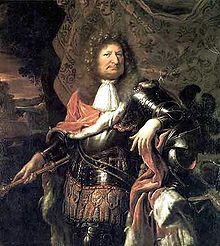You can just bet that media reaction to Oliver Knussen's Prom 15 will be rabid. Why did he programme pieces that take 3 minutes to play and need 20 minutes to set up? But that's Ollie all over, having fun and confounding expectations. Quite possibly the same Pretty Plastic Pundits who think random applauding is clever will howl when Ollie gives them exactly the kind of concert where "rules" for clapping don't apply.
Much horror too, because Knussen programmed Stockhausen with Schumann. Again, this is no big deal - Simon Holt's
a table of noises was the surprise hit of
Prom 13, where it unexpectedly won over an audience who'd come for Schumann and Strauss. Mixed programming is nothing new, unless you've spent the last 100 years under a rock. Henry Wood did it too.
So what's Ollie's point? Confounding assumptions = shaking up preconceptions. First, no-one died because they had to hear Stockhausen's
Jubilee. It's joyous, celebratory, fill of "starburst" cadences, twinkling tracery and trumpets heard off stage like angels in the heavens. Dramatic and even benevolent, not "difficult" at all. Jubilee is Stockhausen's tribute to the folk music of his native homeland, the star Sirius.
Then Harrison Birtwistle's
Sonance Severance 2000 (1999), only three minutes long, but requires massed celli, basses and brass. Again, that's the point. Massed brass herald the first theme,winds and strings develop it and suddenly it snaps shut with a humorous bleat from single trumpet. A symphony compressed to its essence which lies hanging, hinting that more is yet to come. It was written for the reopening of Severance Hall in Cleveland, so the idea is perfectly cogent.
Sonance Severance connected Stockhausen's
Jubilee with Colin Matthews's
Violin Concerto (2009). I wasn't knocked sideways, though my companion was impressed, but so what? First reactions are first reactions. On rebroadcast I've grown to appreciate why I liked Leila Josefowicz's high, flowing legato so much. It's elusive, floating dream like,
sognando, about the constant flux in the orchestra. My partner was much taken by the alternations in the sections of the second movement.
Then, the culmination of the first part of this programme, with its sparkling stars, fairy violins and magic trumpets. Luke Bedford's
Outblaze the Sky (2006). Another tiny, six minute work that packs a punch many larger pieces cannot equal. Exquisite passages, shimmering on densely resonant background. Immediately I thought of Britten's
Sea Interludes, though it's certainly not like them, and they weren't on Bedford's mind when he wrote the piece. He was thinking in terms of poetic dream. He says
"I imagined the piece to have a warmth and certain haziness, ....virtually every pitch is scored with glissandos, harmonics, flutter-tonguing, tremolandos and molto vibrato".
I loved the way
Outblaze the Sky draws you into these mysterious undercurrents, then suddenly erupts in upward chords of illlumination. Waking towards the dawn? A flash of insight into some mystery? It doesn't matter, it's a beautiful piece of music and uplifting. (lots more on Luke Bedford on this site)
At first, it seemed odd to switch from this luminous mode to music about the mighty Rhine. Bernd Alois Zimmermann
Rheinische Kirmestänze (1950) was paired with Robert Schumann's
Symphony no 3 also known as the Rhenish, because it was inspired by the Rhine. "Only connect" Knussen seems to say. Knussen's programmes are often like intricate puzzles, with myriad cross-references that illuminate the works in new ways.
Both Zimmermann and Schumann loved the Rhine. Rivers are a powerful metaphor for creativity. In the case of the Rhine, it springs from the Alps, right through the heart of Germany. After the demonic
Prom 4, no-one attentive shouldn't recognize what the Alps mean in terms of the Romantic imagination. (another intelligent undercurrent in this year's BBC Proms).
For Schumann, and for Zimmermann, the Rhine isn't simply a tourist trip, decorated by Rhinemaidens. Both Zimmermann and Schumann were deeply intellectual, both prone to depression. Schumann tried to commit suicide by junping into the Rhine, Zimmermann, who grew up on its banks, was more successful.
It is very significant that Zimmerman's
Rheinische Kirmestänze was first written almost exactly 100 years after Schumann's suicide attempt, for Zimmermann knew Schumann's music very well. The
Rheinische Kirmestänze are most definitely not quaint or folksy. The war had just ended, Germany was occupied, and the trauma of Nazism and the Holocaust hung heavily , especially on a left liberal like Zimmermann. Zimmermann uses references to kitsch like brass bands but completely undercuts any sense of gemütlich by smearing the certainties with strange cross-rhythmic distortion. Though they're lively, these Rheinische dances are haunted.. (lots more on Zimmermann on this site, use "search")
Then Knussen springs another surprise! So far in this Proms season,. all the Schumann so far (except for
Manfred with Petrenko, Prom 4) has been indifferently performed at best, especially disappointing in this Schumann year. Then, Knussen, with his reputation made in new music, goes and conducts the finest Schumann performance of all! This worked for me because it accessed the wilder aspects of late Schumann, which I don't think we've really begun to appreciate.
Wonderfully alert, energetic playing from the BBC Symphony Orchestra, the top BBC orchestra by far. This was a joy to hear - listen to the
repeat broadcast online, it beats many better known versions. Again, it's inspired by Knussen's feel for musical puzzles. Listen to the final part of the last movement, the Lebhaft (derived from
Leben). A similar apotheosis to the final upthrust in Bedford's
Outblaze the Sky and Birtwistle's
Sonance Severance! "New" and "old" are silly labels. The sooner people listen "as music", the more they'll get from it. If only Schumann, who adored cryptic musical puzzles, could have heard Knussen's Prom.












.jpg)







